Related Centers
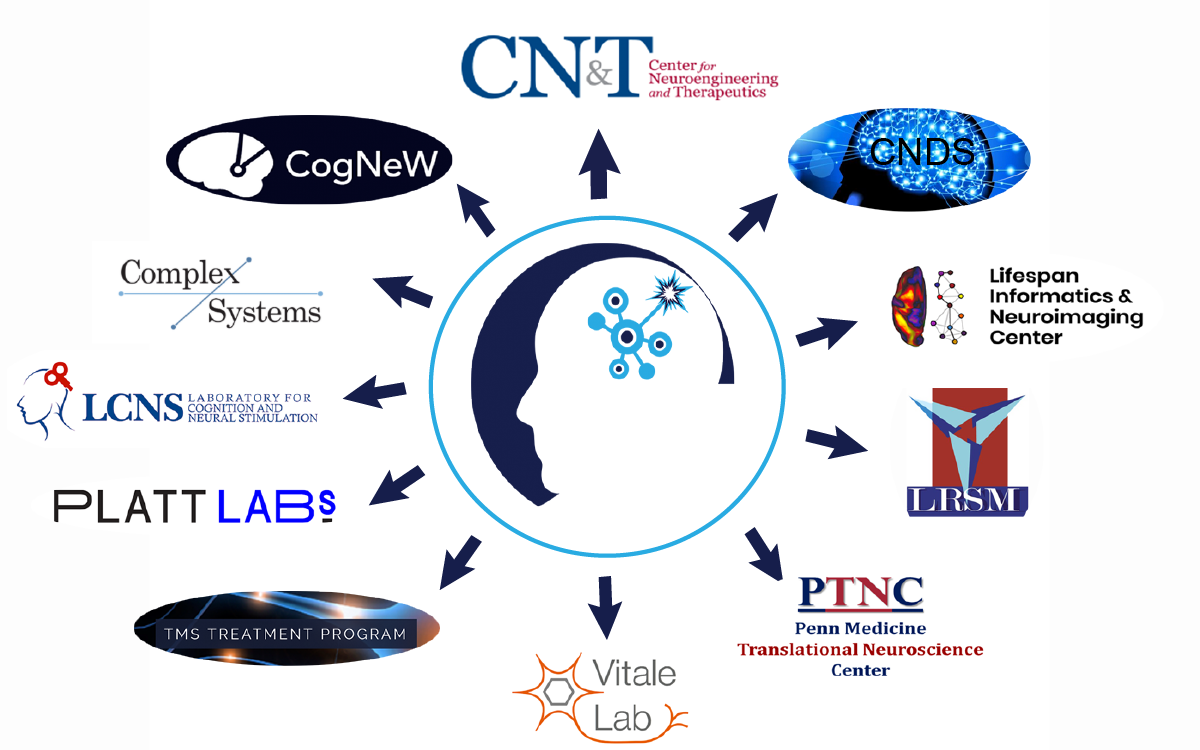
- Center for Brain Imaging and Stimulation
- Center for Neuroengineering and Therapeutics
- Center for Neuromodulation in Depression and Stress (CNDS)
- The Cognitive Neuroengineering & Wellbeing Laboratory (CogNeW)
- Complex Systems Lab
- Laboratory for Cognition and Neural Stimulation (LCNS)
- Laboratory for Research on the Structure of Matter (LRSM)
- Lifespan Informatics & Neuroimaging Center
- MindCORE (Center for Outreach, Research, and Education)
- Penn Medicine Translational Neuroscience Center (PTNC)
- PlattLabs
- TMS Treatment Program
- Vitale Laboratory
Center for Brain Imaging and Stimulation
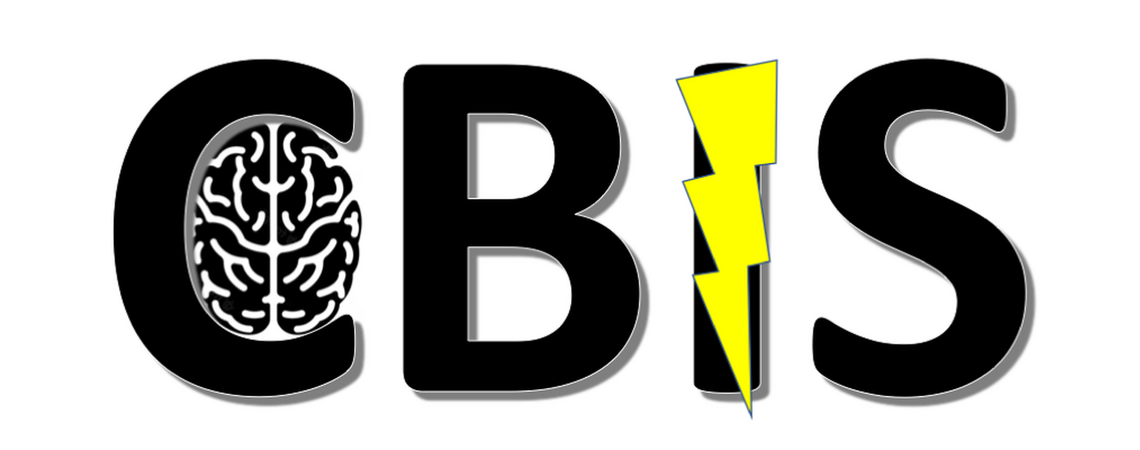
The Center for Brain Imaging and Stimulation leverages cutting edge neuroimaging to guide brain stimulation for interrogating and manipulating brain networks, especially those involved in neuropsychiatric conditions. The Center pursues TMS/fMRI methods development research with broad applications to cognitive and affective systems; it interleaves single-pulse Transcranial Magnetic Stimulation (TMS) with functional MRI recordings (TMS/fMRI). The Center benefits from the slow rise time of the BOLD response to interleave TMS pulses and to capture the resulting brain activity caused by TMS to the surface of the brain. Additionally, the group uses structural and functional MRI to guide efforts to influence behavior, cognitive function, psychophysiological responses, and symptoms, especially in depression and post-traumatic stress with repetitive trains of TMS (rTMS).
Center for Neuroengineering and Therapeutics
Penn's Center for Neuroengineering & Therapeutics (CNT) works to develop and test new devices to restore brain and nervous system function that was lost to disease and disability. Researchers aim to map neural code in brain and nervous system disorders in order to determine how to restore or improve function, engineer new mapping and treatment technologies for patient care, and to use medicine, engineering, neuroscience, and industry to educate peers and leaders in the field.
CNT is comprised of multiple core labs who employ invasive neurophysiology, neuroimaging, neuroengineering, translational neuromodulation, and neuroprosthetics to treat a variety of neurological disorders and injuries, as well as enhance patient treatment and care.
Center for Neuromodulation in Depression and Stress (CNDS)
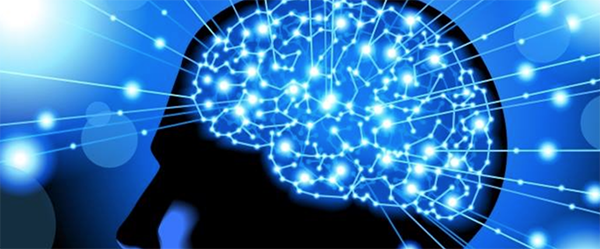
At the Center for Neuromodulation in Depression and Stress (CNDS), researchers specialize in the science and treatment of affective disorders, leveraging cutting-edge neuroscience with the goal of developing personalized treatment for patients with affective disorders. One focus of research in the center is on the development of TMS and TMS/fMRI methods that explore the causes of affective disorders like depression and anxiety and improve neuromodulatory treatment for these disorders. This line of work uses a combination of healthy volunteer and patient research with a focus on changes in cognitive/affective/psychophysiological symptoms and brain connectivity following neuromodulation.
The Cognitive Neuroengineering & Wellbeing Laboratory (CogNeW)

Drexel University's Cognitive Neuroengineering & Wellbeing Laboratory (CogNeW) studies the effects of neural control on the brain, behavior, and society. Made up of a team of cognitive neuroscientists, computer scientists, and engineers, the laboratory conducts "use-inspired" research which combines neurostimulation, control theory, and clinical and cognitive neuroscience.
The laboratory's main focus concerns cognitive network neuroscience, precision neuromodulation, decision science, and neuroethics. Their mission is to increase human wellbeing and resolve ehtical dilemmas through the study of the improvement of cognitive and motor functions.
Complex Systems Lab

Complex Systems Lab at Penn studies biological, physical, and social systems by using and developing tools from network science and complex systems theory. Their broad goal is to isolate issues at the intersection of basic science, engineering, and clinical medicinethat can be tackled using systems-level approaches.
Laboratory for Cognition and Neural Stimulation (LCNS)

The Laboratory for Cognition and Neural Stimulation (LCNS) is made up of a team of scientists and clinicians within the Neurology Department the University of Pennsylvania. The team's central focus is to use noninvasive neuromodulation techniques to further elucidate the neural basis of cognition, develop and implement novel stimulation-based therapies for neurologic disorders, particularly those that affect cognition and sensorimotor function throughout the lifespan, and to reveal critical and modifiable behaviorally-relevant circuit and network properties of the human brain.
LCNS combines noninvasive brain stimulation with complimentary approaches such as behavioral measures or structural and functional neuroimaging. The laboratory aims to make innovative and groundbreaking discoveries that will advance the use of noninvasive neuromodulation in the fields of cognitive neuroscience, neurology, and neurorehabilitation.
Laboratory for Research on the Structure of Matter (LRSM)
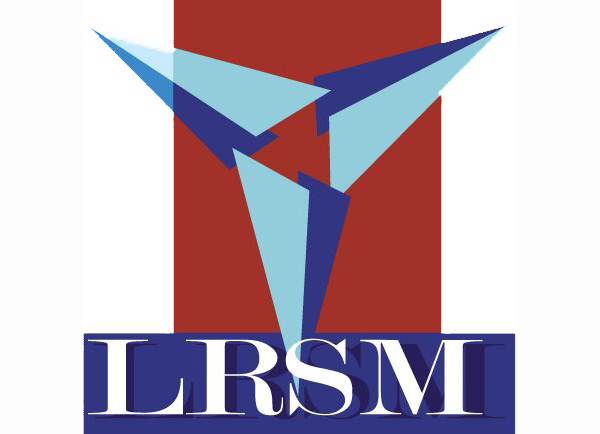
The Laboratory for Research on the Structure of Matter (LRSM) is the University of Pennsylvania's premiere center for materials research. Founded in 1960, the LRSM takes a multidisciplinary approach to materials problems which underlie technologies and the research and educational needs of society. The center encourages and facilitates collaboration across both faculty and schools stretching the entire Penn campus, and nurtures partnerships with governments, industries, and academia. LRSM also hosts the Materials Research, Science, and Engineering Center (MRSEC), and its subsequent Interdisciplinary Research Groups (IRGs), and a variety of educational and outreach activities. These educational and outreach programs serve to increase broader public awareness of ideas in materials science and engineering, as well as to encourage Americans to pursue STEM fields and higher education, with a primary focus on minorities, women, and the disabled.
Lifespan Informatics & Neuroimaging Center
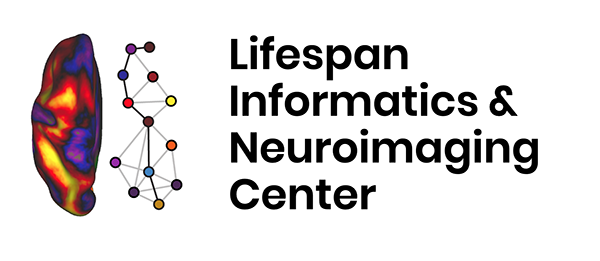
The Lifespan Informatics & Neuroimaging Center (LINC) uses advanced analytics to integrate complex brain images and behavioral data. The center's main objective is to map normal brain development using neuroimaging, network science, and machine learning methods in order to understand how alterations in brain maturation increase risk of psychiatric illness.
MindCORE (Center for Outreach, Research, and Education)

MindCORE is Penn’s hub for the integrative study of the mind.
Penn MindCORE is an interdisciplinary effort to understand human intelligence and behavior. Research programs in MindCORE bring together faculty with diverse approaches to the study of the mind, from disciplines in the Arts & Sciences ranging from Psychology, Biology, Cognitive Science, Neuroscience, and Physics to Economics, Linguistics, Political Science, Sociology, and Philosophy; and they bridge to centers and departments in Medicine, Wharton, Engineering, and Annenberg. MindCORE supports undergraduate and graduate programs that are educating the next generation of students of the mind. MindCORE promotes cutting-edge research, increases the broader societal impact of new knowledge about human behavior and decision making gained from current research, and works to influence public policy and education through coordinated outreach programs.
Penn Medicine Translational Neuroscience Center (PTNC)
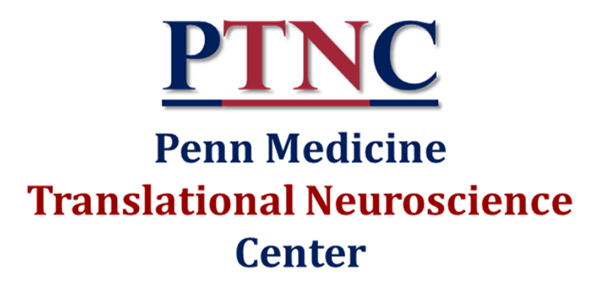
The Penn Medicine Translational Neuroscience Center (PTNC), as a part of the Perelman School of Medicine (PSOM) at the University of Pennsylvania, is committed to transforming prevention, diagnosis, and treatment of neurological and neuropsychiatric conditions. PTNC has also partnered with multiple institutions to fund infastructures through which to support research, programs, and treatments.
PlattLabs

PlattLabs' central focus is on how the brain makes decisions, and on the biological mechanisms that allow humans and other animals to make decisions. In order to study environmental factors and subsequent influences on decision making processes, PlattLabs uses varied techniques, including microstimulation, single neuron recordings, brain imaging, eye tracking, and neuropharmacology. Motivated by evolutionary biology, ethology, and economics, researchers and clinicians study behavioral patterns and the decision making processes in humans and other animals, and how these processes relate their environments and treatments for disorders.
PlattLabs envelopes a variety of researchers and multiple research areas, including brain and cognitive science, as well as clinical and social psychology.
TMS Treatment Program

The Transcranial Magnetic Stimulation (TMS) Treatment Program at The University of Pennsylvania offers a non-invasive, outpatient-based form of brain stimulation therapy for mood disorders. Our program is one of the leading TMS providers in the US with more than 10,000 TMS sessions administered over the last 10 years. The University of Pennsylvania TMS service was involved with the largest study of TMS as a treatment for major depression. That large, multicenter study showed that TMS is a well-tolerated and effective treatment option for patients with depression and was pivotal for its subsequent FDA approval. Data on the effectiveness and safety of TMS provided at our clinical center after FDA approval has been published in academic peer reviewed journals.
Based in the outpatient treatment facility of the Department of Psychiatry of the University of Pennsylvania at 3535 Market Street, our TMS center is directed by experts on mood disorders and neuromodulation to ensure adequacy of treatment and to maximize chances of treatment response. The treatment is administered within Penn's medical campus following safety standards to minimize the risk of complications.
Vitale Laboratory

The Vitale Laboratory works to create innovative technologies to study, monitor, and treat neurological and neuromuscular disorders such as epilepsy, Parkinson's disease, nerve injury, and chronic pain. Researchers and engineers seek to monitor and modulate the nervous system at high resolution and on multiple scales through integrating properties of nanostructured materials into bioelectronic interfaces.
The group is comprised of engineers, physicists, materials scientists, neuroscientists, and clinicians from across the University of Pennsylvania who all seek to translate research findings into treatments that can be applied in clinical settings.


